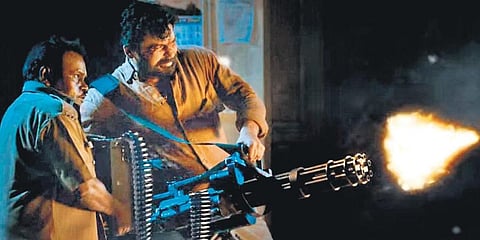Sense of a scene: Kaithi climax breakdown - All guns blazing
In this week’s column, writer Pon Parthiban talks about co-writing the high octane climax of Kaithi.
"I came aboard Kaithi only a few days before the film went on floors. So, the base was already set and I had to only improve upon it and help director Lokesh Kanagaraj translate his vision better. Right from the first draft, the plan was for the climax to end with the shootout scene. The weapon used isn’t the normal gun used by the constables which has a knife attached to it. So using a gatling gun out of nowhere would have been a very foolish idea, but, Lokesh had wisely planted a scene to foreshadow the final showdown.
I believe this is the most fitting climax for the film as Karthi’s Dilli is already wounded. Making him do a fistfight would have been illogical and the gun became a clever tactic for him to take on Anbu’s mob.
Some had shared concerns that the sequence felt a bit too long. But what we intended to show on screen was an effect similar to the rampage of a hurricane. Only when the sequence is so strong and loud, would the audience feel a sense of satisfaction towards the end. I believe the effect would have been lessened if the editing had been rushed.
The technique we have used in the climax is called Chekhov’s Gun, which says that when an object or a plot point is focused on in the initial scenes, it must influence the story later. Director Mahendran had used a similar technique in his Nenjathai Killathe. Suhaasini’s character is established as a runner in the first few scenes and he later used that to make the audience believe that this girl can run with ease in the climax, where she rushes to meet her man.
Building tension constantly is essential to keeping the audience hooked. Since the life of the college students and the innocent cop was at stake, the audience wanted the hero to win against all odds. This is the reason why a lot of romances have their climax set in railway stations and airports.
I believe theatre moments like Kaithi’s climax happen organically. Theatre moments are of three types — audience laughing their hearts out, cheering for the characters, or shedding tears for them. Writing a scene which leads to these moments is a big challenge for writers like me. We introduce Karthi’s Dilli as a nobody without a backstory, and slowly, we reveal his nature to the audience. When he finally says, ‘Naan ulla irundhen nu theriyum, edhuku irundhen nu theriyuma?’ or when we see a rugged illiterate guy like him wield a machine gun, it makes the audience excited and it becomes a proper theatre moment. But this must happen organically. If we work around one scene specifically like the interval or the intro, only that will stand out while the rest of the film collapses. It would never become a complete film.
As you know, the script was written keeping Mansoor Ali Khan in mind. If he had done the scene, the massive gatling gun would have looked like a baby in his hands. We credited Virumandi for inspiring Dilli’s character. We also did some research on long-term prisoners to understand how they get transformed over the period of their imprisonment. Invariably, most of them become calmer and embrace spirituality. That’s the reason for the viboodhi pattai on Karthi’s forehead.
Some people wonder about the workflow when many writers come together to pen a single script. No matter how many people work on a story, the final call will be taken by the director as the rest of us are working together for his vision. Since I worked as an assistant to Hari sir, it is easier for me to take into consideration the pros and cons of shooting a scene.
Directors are expected to make their identity felt with every film, but it’s the opposite for writers. We must merge within the film and lose ourselves within its story. If a writer tries hard to make his presence felt, it would seem odd. Writer oda saayal theriyama ezhudhuradhu dhaana periya saadhanai.”

